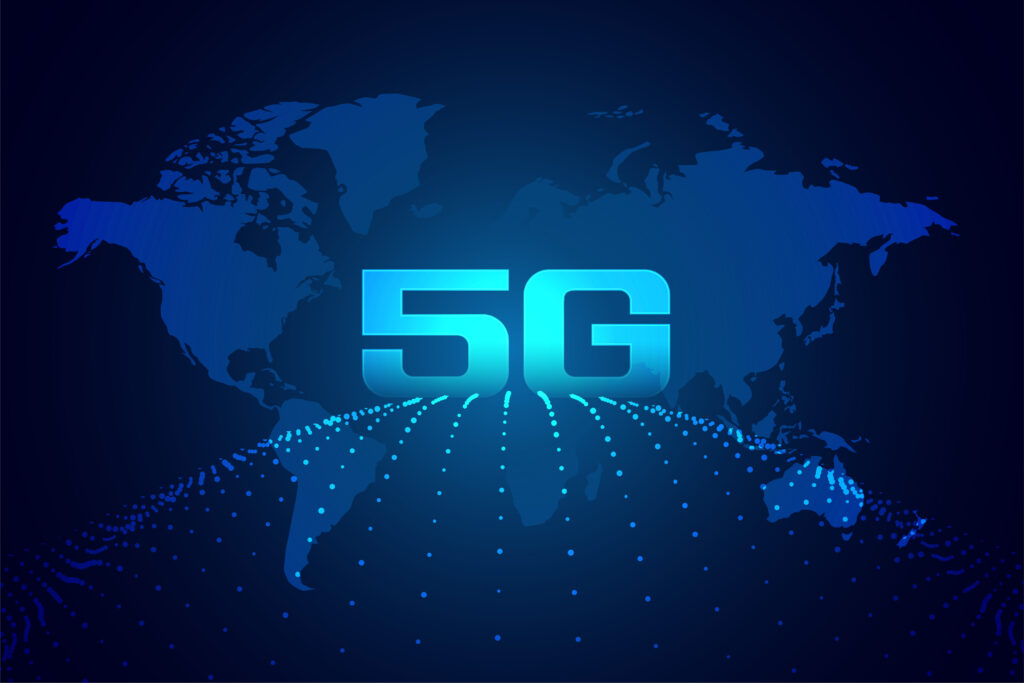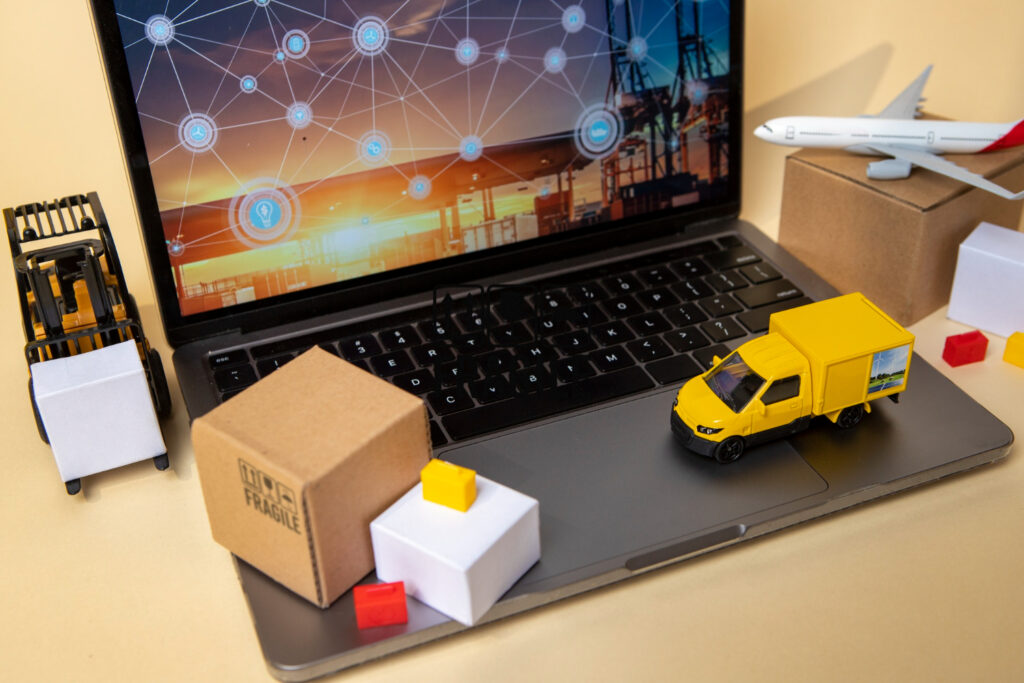Hello and welcome to the future of connectivity! The buzz around 5G technology has grown in recent years, promising to revolutionize the way we communicate, connect, and interact with the digital world. 5G is set to usher in a new era of possibilities and reshape various industries, thanks to its lightning-fast speeds, lower latency, and enhanced capabilities. In this blog post, we will look at the future impact of 5G technology and how it will change our lives in profound ways.
Table of Contents
Understanding 5G Technology
Before delving into its implications, let us first define 5G technology. As the fifth generation of wireless technology, 5G promises 100 times faster speeds than 4G. This means that downloading movies, streaming HD videos, and accessing data-intensive applications will become nearly instantaneous.
Furthermore, 5G reduces latency, which is the time it takes for data to travel between devices and networks. Latency will be reduced to milliseconds with 5G, enabling real-time interactions and seamless experiences. This is a game changer for applications such as online gaming, augmented reality, and remote surgeries that require split-second decisions and actions.
The Role of 5G in Various Industries
The impact of 5G technology extends far beyond faster internet speeds and lower latency. It holds immense potential to transform numerous industries and sectors. Let’s explore some of the key areas where 5G will make a significant impact.
1. 5G and Telecommunications:
The telecommunications industry is at the forefront of 5G adoption because it allows network operators to provide customers with faster, more reliable connectivity. We can expect better call quality, seamless video conferencing, and a proliferation of advanced communication services with 5G.
2. 5G and Healthcare:
5G has the potential to revolutionize patient care in the healthcare sector. Doctors can perform remote surgeries, collaborate with specialists in real-time, and provide telemedicine services to patients in remote areas thanks to its ultra-low latency and high-speed connectivity. Furthermore, the Internet of Medical Things (IoMT) will thrive, allowing for better patient monitoring and efficient healthcare system management.
3. 5G and Automotive:
With the arrival of 5G, the automotive industry will undergo a significant transformation. Connected vehicles will become the norm, allowing for seamless communication among vehicles, traffic infrastructure, and pedestrians. This will improve road safety, enable autonomous driving, and open up new transportation possibilities such as smart traffic management and predictive maintenance.
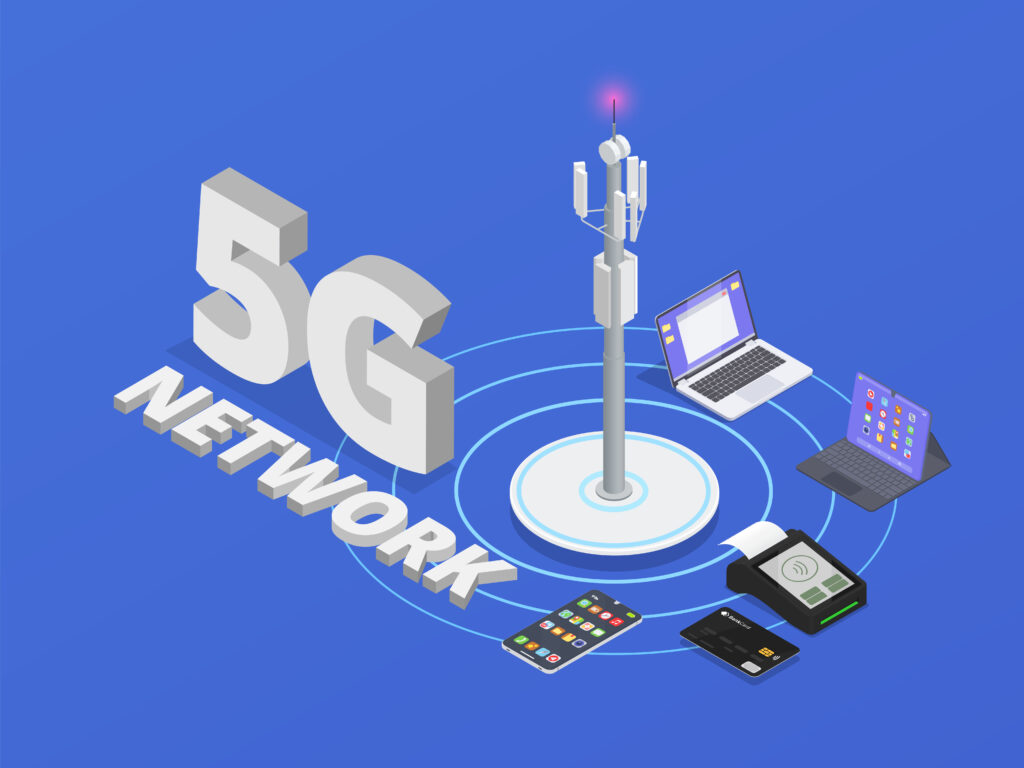
4. 5G and Education:
Education is another industry that will benefit greatly from 5G technology. Students can access online educational resources, participate in immersive virtual classrooms, and collaborate with peers all over the world with faster internet speeds. 5G will also enable remote learning opportunities, bridging the divide between urban and rural students.
5. 5G and Entertainment:
With 5G, the entertainment industry will undergo a paradigm shift. Streaming services will reach new heights, with 4K and 8K resolutions delivering high-quality, lag-free content. Immersive gaming experiences, interactive storytelling, and virtual tourism will become commonplace thanks to virtual and augmented reality applications.
6. 5G and Manufacturing:
5G will power the next industrial revolution, also known as Industry 4.0. Manufacturers can implement real-time monitoring and control systems, optimize production processes through machine learning, and enable seamless communication between machines and humans thanks to its high-speed, low-latency connectivity. This will increase productivity, decrease downtime, and improve automation.
7. 5G and Retail:
With the implementation of 5G, the retail industry will undergo a transformational shift. Personalized shopping experiences, augmented reality product visualization, and seamless mobile payments will all be possible. Retailers can also use 5G to improve inventory management, supply chain logistics, and customer engagement through targeted marketing campaigns.
8. 5G and Smart Cities:
5G technology is critical in the development of future smart cities. It will allow for real-time monitoring and management of critical infrastructure such as power grids, transportation systems, and waste management. Smart street lighting, intelligent transport systems, and efficient resource allocation are just a few ways 5G can improve urban livability and sustainability.
9. 5G and Agriculture:
The agricultural sector can also benefit from 5G’s power. Farmers can get real-time data on soil moisture, crop health, and weather conditions from connected sensors and IoT devices. This allows for more precise irrigation, more efficient resource utilization, and early detection of diseases or pests. 5G technology has the potential to revolutionize farming techniques and contribute to more sustainable agricultural practices.
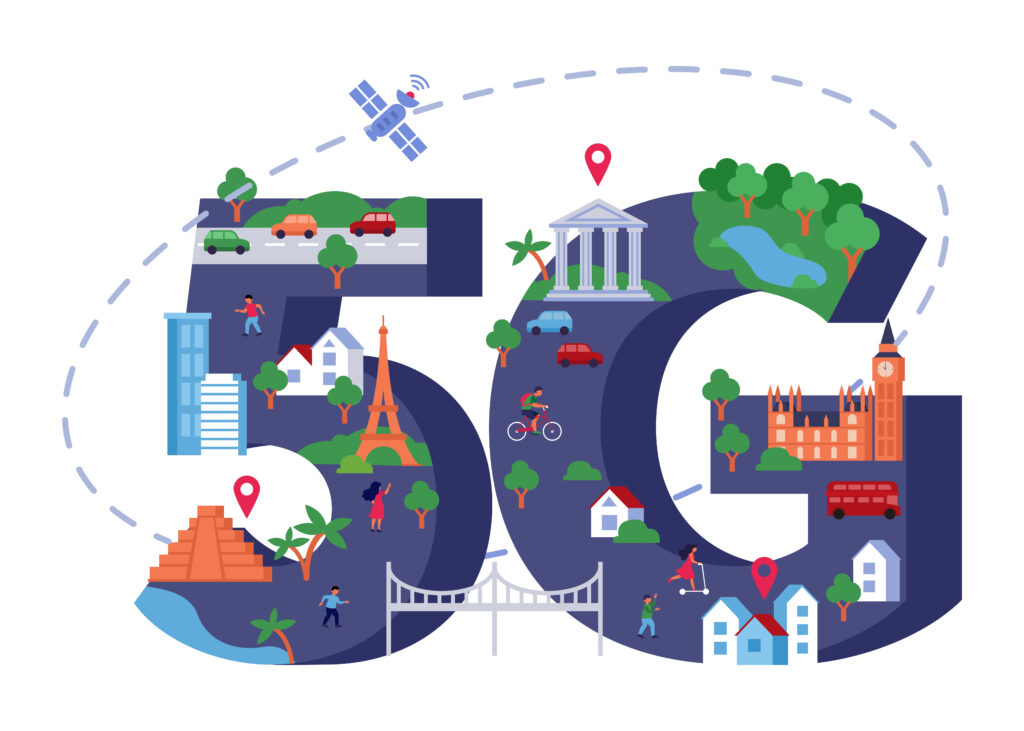
Advantages and Benefits of 5G Technology
The widespread adoption of 5G technology brings with it a slew of benefits for individuals, businesses, and society as a whole. Let’s look at the key benefits that 5G brings to the table.
1. Faster download and upload speeds:
With 5G, the days of impatiently waiting for files to download or uploads to complete are over. The ultra-fast speeds of 5G enable faster access to information, seamless streaming, and efficient file transfers.
2. Reduced latency for a seamless user experience:
The ultra-low latency of 5G enables real-time interactions and lag-free experiences. Reduced latency ensures smooth and instant connectivity in online gaming, video conferencing, and autonomous vehicle communication.
3. Improved network reliability and stability:
5G technology improves network reliability, resulting in fewer dropped calls and interruptions. This is especially important in scenarios where a stable connection is critical, such as emergency services or critical infrastructure management.
4. Facilitating the growth of the Internet of Things (IoT):
With billions of interconnected devices, the Internet of Things is rapidly expanding. The high network capacity of 5G and its efficient handling of massive IoT traffic enable seamless device connectivity and communication. This enables IoT applications ranging from smart homes and wearables to industrial automation and smart cities to realize their full potential.
5. Enabling real-time and immersive experiences:
Real-time and immersive experiences become a reality with 5G. Consider visiting a virtual museum, attending a live concert in virtual reality, or having real-time remote surgery performed by a specialist. The high-speed and low-latency connectivity of 5G paves the way for previously unthinkable experiences.
6. Unlocking new possibilities for businesses and industries:
5G technology serves as an innovation catalyst, allowing businesses to explore new possibilities and develop transformative solutions. 5G opens up a world of opportunities for entrepreneurs, startups, and established enterprises, from autonomous vehicles and advanced robotics to smart infrastructure and personalized services.
7. Bridging the digital divide in rural areas:
Rural areas frequently have limited connectivity options, making it difficult to access critical services and opportunities. 5G has the potential to close this digital divide by providing high-speed internet access to underserved communities, enabling remote education and telemedicine services, and empowering individuals by providing equal access to information and resources.
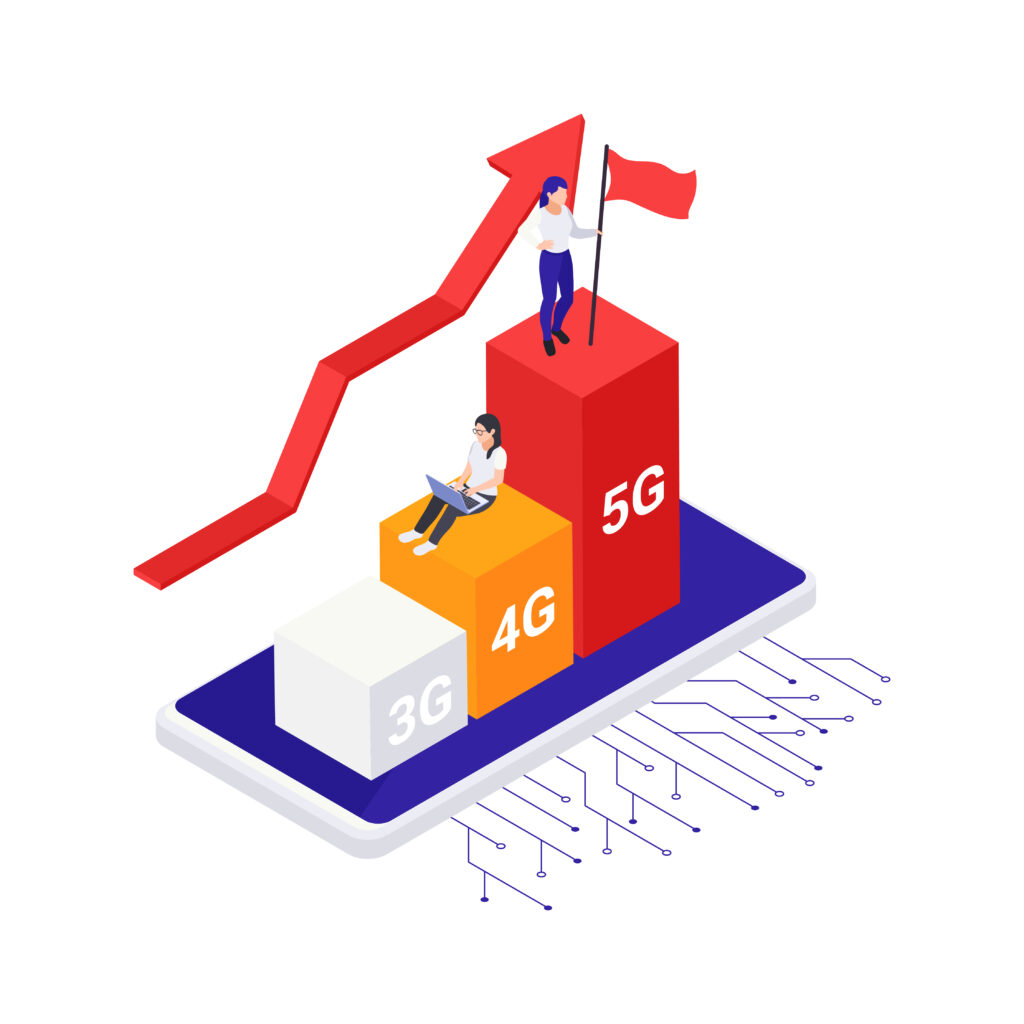
Challenges and Concerns with 5G Implementation
While 5G brings a plethora of benefits, its implementation also poses certain challenges and concerns that need to be addressed.
1. Infrastructure requirements and deployment challenges:
The deployment of 5G necessitates significant infrastructure investments, such as the installation of small cell sites and fiber-optic networks. The dense network of small cells and towers required for 5G coverage presents difficulties in terms of space, permits, and regulations. Furthermore, the cost of upgrading existing infrastructure to support 5G can be significant.
2. Security and privacy concerns:
With an increase in the number of connected devices and data transmission, ensuring user security and privacy becomes more important. Because of the massive amount of data generated by 5G networks, cyberattacks and breaches are possible. To protect user data and maintain trust in the digital ecosystem, network operators and businesses must implement robust security measures.
3. Potential health and environmental impacts:
Concerns have been raised about the potential health effects of being exposed to higher-frequency radio waves used in 5G networks. Despite extensive research and studies, additional investigation and monitoring are required to ensure the safety of 5G technology. Furthermore, the increased energy consumption and e-waste generated by 5G infrastructure deployment raise environmental concerns that must be addressed.
4. Spectrum allocation and regulatory hurdles:
Allocating appropriate radio frequency spectrum for 5G networks and coordinating frequency usage across multiple regions can be a difficult process. To ensure efficient and fair spectrum use for 5G deployment, spectrum availability, licensing, and regulatory frameworks must be established.
Global Adoption and Deployment of 5G
The race to adopt 5G technology is well underway around the world. Several countries and telecommunications companies are investing heavily in 5G infrastructure and network deployment. Let’s take a look at some of the 5G revolution’s frontrunners and their progress.
Leading countries in 5G implementation: Countries such as the United States, South Korea, China, and Japan have made significant progress in 5G implementation. They have launched 5G networks in major cities, conducted trials, and made significant investments to support infrastructure requirements.
Key players in the 5G market: The 5G market is humming with activity, with major telecommunications and technology companies at the forefront. 5G technology is being developed and deployed by companies such as Verizon, AT&T, Huawei, Samsung, Ericsson, and Qualcomm.
5G rollout plans and progress: Countries and network operators have set aggressive 5G rollout goals. While 5G connectivity is already available in some cities and regions, coverage expansion and the transition from 4G to 5G will take time. The deployment of 5G varies by region, with urban areas typically receiving priority due to their higher population density and demand.
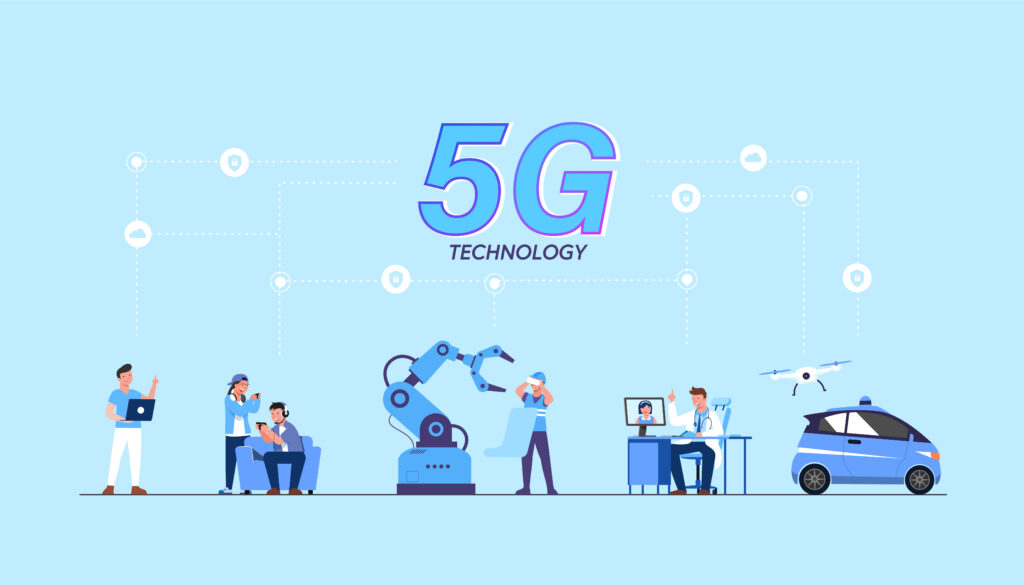
Future Predictions and Trends
Looking ahead, the impact of 5G technology will continue to be felt, shaping various industries and enabling new possibilities. Let’s look at some predictions and trends that may emerge in the coming years.
Growth and expansion of 5G technology: The exponential growth trajectory of 5G is expected. More devices and industries will embrace 5G as infrastructure becomes more widespread and affordable, resulting in increased connectivity and seamless integration.
Integration of 5G with emerging technologies: 5G will converge with other emerging technologies such as AI, edge computing, and the Internet of Things (IoT). This convergence will allow for the development of intelligent and connected systems, which will lead to advancements in smart cities, autonomous vehicles, and personalized experiences.
Impact on various industries in the next decade: 5G technology will leave an indelible mark on a variety of industries over the next decade. Telemedicine, precision agriculture, smart homes, immersive entertainment, and industrial automation will all see advances. These advancements will change the way we work, live, and interact with our surroundings.
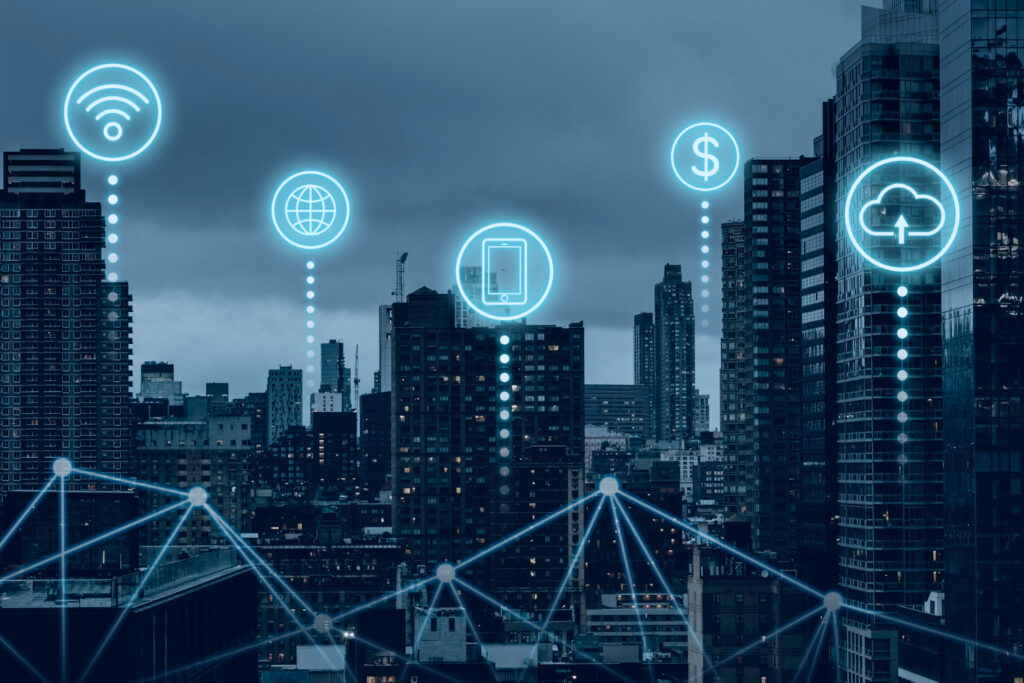
Conclusion
With the introduction of 5G technology, the future holds enormous promise. It has the potential to reshape industries, enable innovative solutions, and connect the world like never before. As we move forward, it is critical to address the challenges and concerns associated with 5G while leveraging its transformative power to create a connected future that benefits everyone. So strap in for an exciting journey into the future of technology and connectivity with 5G.

